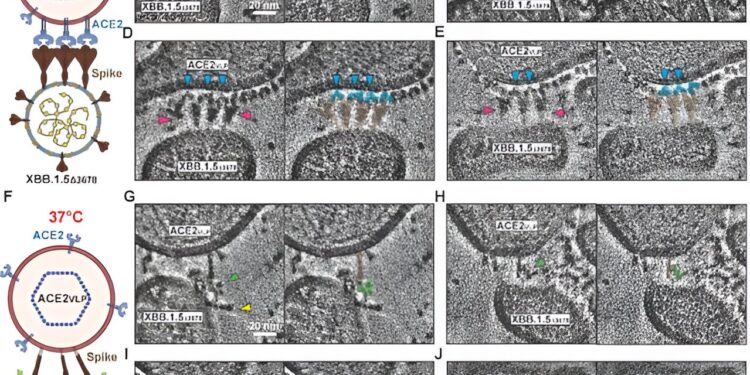Capture of the SARS-CoV-2 XBB.1.5 virusΔ3678 Spike-ACE2 complexes and pre-hairpin intermediates bound to antibodies between membranes. Credit: Science (2024). DOI: 10.1126/science.adn5658
Northeastern researchers say they have discovered how an antibody could provide broad protection against severe acute respiratory syndrome coronavirus-2 (SARS-CoV-2), the virus that causes COVID-19, even as it evolves to evade other chemical defenses in the body.
Researchers have been studying the structure of the SARS-CoV-2 Spike protein, the external projections of the virus’ membrane that are responsible for the virus’s entry into a human cell. After the COVID-19 pandemic emerged, scientists quickly identified how the Spike protein allows the virus to latch onto a cell, by binding to an enzyme called the ACE-2 receptor.
But it wasn’t until researchers began studying the structure of the Spike protein that they began to learn more about its somewhat limb-like design: These protruding strands undergo rearrangement as they “pull” a cell toward them and initiate fusion.
“For an infection to occur, the spike protein has to get out and take over a human cell,” says Paul Whitford, an associate professor of physics at Northeastern who co-led the theoretical aspects of the study, published in Science.
What the researchers showed is that a specific antibody, known as CV3-25, disrupts the cellular infection process by targeting a particular site on the spike protein that is broadly conserved across different virus strains, the study said.
The receptor binding domain, the critical part of the spike protein that allows the virus to “bind” and eventually enter the cell, typically changes as the virus evolves, Whitford says. The region that often remains the same is vulnerable to CV3-25.
Think of it as the virus’s Achilles heel.
The findings suggest that the broadly neutralizing antibody may hold the key to making a vaccine that protects against a rapidly evolving virus.
“This is a natural antibody that has been found in samples taken from people,” Whitford says.
The computational work was conducted jointly by Northeastern’s Center for Theoretical Biological Physics and Rice University, a National Science Foundation physics center. The multi-university team also partnered with a group of researchers from Yale University on the overall study.
Whitford has a history of using theoretical models to study “large molecular assemblies,” that is, chemical structures that include viruses and their surface structures. In the vast world of the infinitely small, Whitford has focused primarily on studying the functioning of the ribosome, a biomolecular machine responsible for producing the proteins that make up living organisms.
Earlier this month, U.S. health officials declared COVID-19 no longer a pandemic, but rather “endemic.” That means the virus is likely to persist, but is now well under control. But Whitford says more contagious and potentially deadly strains of the virus could still emerge.
“This is still a very significant problem, but one that can now be managed in the context of many public health threats and not as a single pandemic threat,” Aron Hall, deputy director for science in the coronavirus and other respiratory viruses division of the Centers for Disease Control and Prevention, recently said, according to NPR. “So the way we approach COVID-19 is very similar to the way we approach other endemic diseases.”
These findings are important because scientists have not yet produced a vaccine that protects against all current and future variants of the virus, Whitford says.
“We are currently managing to contain the virus, but it continues to mutate,” Whitford said.
Whitford says the antibody could be “the next big target” for designing new vaccines.
“This opens the door to a new vaccine strategy,” he says. “While current vaccines try to block the arms, our results show that it is possible to attach the legs instead, giving us a new weapon to fight this ever-evolving virus.”
More information:
Michael W. Grunst et al., Structure and inhibition of SARS-CoV-2 spike folding in membranes, Science (2024). DOI: 10.1126/science.adn5658
Provided by Northeastern University
This story is republished with kind permission from Northeastern Global News news.northeastern.edu.
Quote:Antibody could offer complete protection against SARS-CoV-2 virus evolution (2024, August 16) retrieved August 16, 2024 from
This document is subject to copyright. Apart from any fair dealing for the purpose of private study or research, no part may be reproduced without written permission. The content is provided for informational purposes only.



